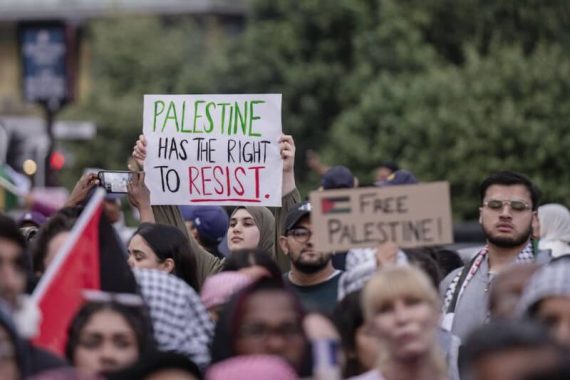T
he adeptly prepared attack by Hamas from air, sea, and land on October 7 has revealed that traditional threats persist for Israel. Specifically, Hamas at the local level and Iran at the regional level pose an existential threat to Israel.
In addition, although the existence of terrorist threats has always posed a security risk for Israel, further indirect security threats for the country have arisen from the recent coups in Africa, which have created instability; the strengthening of terrorist organizations such as Al-Qaeda and DAESH; and and the presence of factions of the latter across the African continent. In this context, Israel’s security policy in Africa focuses on effective measures against terrorist threats and the expansion of radicalization.
In recent years, Israel has sought to increase its security cooperation by developing relations with African countries through deepening diplomatic ties. Israel maintains cooperation with various new partners in Africa through security intelligence, counterterrorism, border control, and arms transfers. In this way, it aims to gain significant advantages both to ensure its own security more effectively and to increase its legitimacy in the international community.
Africa’s strategic location, especially East Africa, has the potential to offer Israel significant support in combating regional threats. Iran’s growing presence in Africa and the rise of radicalism and terrorism in the continent in recent years have shaped Israel’s approach to the continent in the context of security.
African countries’ positions on the Israel-Palestine conflict
Ugandan President Yoweri Museveni expressed regret over the renewal of violence in Israel-Palestine, emphasized that the issue was the failure to implement the two-state solution and called for restraint. He stated that the targeting of civilians should be condemned. Like Uganda, the governments of Nigeria, Senegal, and Tanzania have also called for restraint.
The South African government stated that the continued illegal occupation of Palestinian territories, the expansion of settlements, the desecration of Al-Aqsa Mosque and holy sites, and the oppression of the Palestinian people are the main reasons of the current events. South Africa, it must be noted, suffered under an apartheid rule for many years.
It also emphasized the need for a two-state solution and a credible peace process that will fulfill previous United Nations resolutions for a just and comprehensive solution for both sides. He went on to express the necessity of establishing lasting peace by creating a Palestinian state with East Jerusalem as its capital and its territorial integrity intact based on the 1967 borders.
Moussa Faki Mahamat, chairperson of the African Union Commission (AUC), stated that the denial of the fundamental rights of the Palestinian people, in particular the denial of an independent and sovereign state, is the main cause of the persistent Israeli-Palestinian tension. North African countries, among them Algeria, Tunisia, and Egypt and Djibouti have also voiced their support for Palestine.
Kenya described the terrorist attack on Israel as “despicable.” It expressed regret over the carnage and senseless loss of life in the region and condemned those who had a hand in the planning, financing, and execution of the attack. Finally, Kenyan representatives emphasized that although Israel has the right to retaliate, it is seeking a “peaceful” way out.
President of the Democratic Republic of the Congo Felix Tshisekedi stated that the attack on Israel was an act of terrorism and that his country would always cooperate with Tel Aviv in the fight against terrorism. Zambia was also among the countries supporting Israel with a statement condemning the Hamas attacks and emphasizing a diplomatic solution.
Possible scenarios
Ethiopia and Kenya are two of the most prominent countries in the region in terms of Israel’s interests in East Africa. Israel’s development of bilateral relations with Ethiopia, Kenya, South Sudan, and Uganda has the potential to promote the idea of an “alliance” in the face of the unstable and threatening reality that currently characterizes the Middle East. Meanwhile, Israel has embassies in Ethiopia, Kenya, Eritrea, and Rwanda in East Africa, and its interests in the Horn of Africa are more salient in the regional subsystem.
In 2006, Hamas’s victory in the elections in Gaza was perceived as a precursor of the wind of change in the Middle East. Since then, local actors have voiced rumors that Hamas would launch a major offensive. However, Hamas’s Al-Aqsa Flood Operation on October 7 was a great shock for Israel, similar to the 1973 Yom Kippur War.
In the past, Israel has responded to attacks with retaliation. After recovering from the shock, Israel is likely to continue its intensive bombardment and attacks on Gaza, which it frames as deterrent measures, for a prolonged time. In this process, it seems possible that actors such as Hezbollah, Hashd al-Shaabi, and Houthis will support Hamas in different ways due to the magnitude of the attack on Gaza.
In this scenario, there is also a risk that the war will move from an Israel-Hamas dimension to a regional dimension. Even in the mid-term, if not in the short term, various groups in Africa may support this war from different standpoints. In Nigeria, for example, Sheikh Ibrahim Zakzaky, the Shiite leader of the Islamic Movement of Nigeria (IMN), has long had close ties with Iran.
If the war gains a regional dimension, it is possible that Zakzaky may mobilize in support of Palestine. Yet, different problems may arise at this point: just as the IMN wants an Islamic state based on Islamic law in Nigeria, Boko Haram, which declared its allegiance to DAESH, also wants an Islamic state based on Islamic law.
The existence of this common desire gives rise to the possibility that Boko Haram, which is effective in Nigeria and its surroundings, may declare a global jihad. As a matter of fact, the coups that have been taking place in the Sahel for a long time and the instability caused by these coups have created power vacuums in the region, which various terrorist organizations have attempted to fill.
Meanwhile, the involvement of al-Shabaab in Somalia and the Al-Qaeda affiliates in Africa, especially in the Sahel, in line with the call for a global jihad may also arise. However, even if a global jihad is declared, Hamas will not welcome another non-state armed actor fighting alongside it in Gaza.
Considering the presence of DAESH in Morocco and at certain points in Egypt’s Sinai Peninsula, as well as the current environment in Libya, a conflict with Israel over the Sinai Peninsula should also be considered among the possibilities.
Therefore, this situation may make it possible for the above actors to attack Israel through different geographies. If there is a possibility of radical groups and terrorist organizations in Africa attacking Israel, it is likely to happen in two ways:
- From the Sahel Belt, through Libya to the Egyptian-Sinai Peninsula and east through Port Sudan to the Red Sea to reach the Egyptian Sinai Peninsula.
- A direct threat to Israel with access to the Gulf of Aqaba.
However, the fact that Israeli forces will be divided from many different points in this context has the potential to draw new fronts and actors into this war.
Terrorist organizations also have the potential to harm Israel’s interests in the periphery of the Sahel. For example, terrorist threats to Morocco in the northwest of the Sahel, Ethiopia, Kenya, Uganda and Rwanda in the east, and Egypt in the northeast are likely to be prominent. As the activities of terrorist organizations increase in Africa, Israel will perceive the terrorist threat in a serious manner.
The threat perceived by Egypt will also be of utmost importance for Israel. With the 1978 Camp David Accords, Egypt ceased to be a threat to Israel. What is more, Egypt has become the second largest recipient of military aid from the United States after Israel and has shared intelligence with Israel.
Therefore, in the post-October 7 period, Israel’s retaliatory intervention in Gaza has the potential to worsen the situation. If, as a result of such an intervention, regional countries and non-state armed actors support Hamas, it is possible that the conflict area will expand and terrorist organizations will be involved in the conflict.
Recommended
Iran-Israel standoff in Africa
Iran is among Israel’s primary security threats. Israel’s and Iran’s quest to increase their influence in Africa in recent years has led to conflicts of interest on the African continent. Iran endeavors to develop and maintain good relations mostly in East Africa with Eritrea, Sudan, and, to a lesser extent, Djibouti. On the other hand, Israel is strengthening its relations with Kenya, Eritrea, Rwanda, and Ethiopia in East Africa.
Given Iran’s poor relations with Saudi Arabia and Yemen on the northern shores of the Red Sea and in the Gulf of Aden, Tehran’s ties with countries on the southern coast are seen as a strategic necessity for its objectives beyond the Persian Gulf. In short, Africa stands out as a different theater of the Iran-Israel standoff, and Israel will seek to consolidate its presence in Africa in order to respond to the perceived Iranian security threats and containment efforts; however, Israel will not rule out the possibility of using this presence to engage Iran on different fronts.
In the context of the Israel-Hamas conflict, it is highly probable that Iran desires the continuation of the tension and the expansion of the theater—Iran finds itself backed into a corner at the regional level and does not have many options left to squeeze out.
The fact that Israel has sided with Azerbaijan in the Azerbaijan-Armenia conflict that ended with Azerbaijan’s victory, the efforts towards the Saudi-Israeli rapprochement, and the normalization of Turkey-Israel relations are all disadvantageous situations for Iran. Iran’s statements in support of Hamas make it possible for Iran to have an influence in terms of regional competition.
Israel’s response to the Hamas operation will most likely be heavy. What is more, such a scenario is likely to worsen the current situation, causing the conflict to spread to different geographies.
In the face of Israel’s attacks on Palestine, terrorist organizations, especially those that utilize Islam to legitimize their ideology and carry out radical acts, have the potential to mobilize in the middle and long term. Recent developments in Africa show that the field is ripe for such mobilizations.





